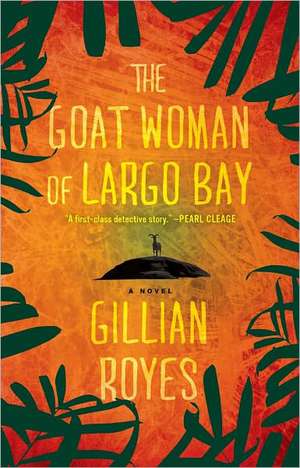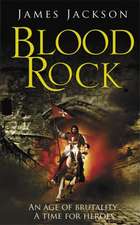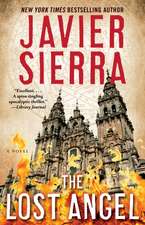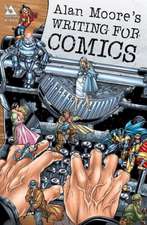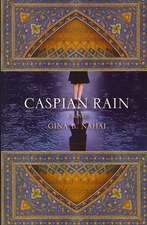The Goat Woman of Largo Bay: A Novel: A Shadrack Myers Mystery
Autor Gillian Royesen Limba Engleză Paperback – 26 sep 2011
When Shad sees movement on the island offshore, he thinks it’s just a goat. But it turns out to be Simone, an American who has run away from her professional and personal life in the U.S., an intriguing woman who captures Eric's heart. Always keeping his ear to the ground, Shad discovers that a gunshot heard near Simone’s place late one night isn’t exactly friendly fire, but tied to a plot to harm Simone and ultimately manipulate local elections. But why does someone want to harm Simone? And what does she have to do with the elections? Only Shad can find out.
An irresistible character is born in The Goat Woman of Largo Bay and Royes wonderfully blends suspense and the soul of the islands in this smart debut.
Preț: 113.10 lei
Nou
Puncte Express: 170
Preț estimativ în valută:
21.65€ • 23.52$ • 18.20£
21.65€ • 23.52$ • 18.20£
Carte disponibilă
Livrare economică 31 martie-14 aprilie
Preluare comenzi: 021 569.72.76
Specificații
ISBN-13: 9781451627411
ISBN-10: 1451627416
Pagini: 320
Dimensiuni: 135 x 210 x 23 mm
Greutate: 0.26 kg
Ediția:Original.
Editura: Atria Books
Colecția Atria Books
Seria A Shadrack Myers Mystery
ISBN-10: 1451627416
Pagini: 320
Dimensiuni: 135 x 210 x 23 mm
Greutate: 0.26 kg
Ediția:Original.
Editura: Atria Books
Colecția Atria Books
Seria A Shadrack Myers Mystery
Extras
A sneak peek at Gillian Royes’s next novel, The Man Who Turned Both Cheeks
CHAPTER ONE
October 2011
With each passing mango tree filtering sunshine onto the asphalt, with each aquamarine bay spreading its arms to welcome him, Shadrack Myers’s forehead crumpled deeper into a frown. The things that usually delighted him––a mongoose scooting across the road, children waving as he drove past––went unnoticed on this trip, so set was his mind on the man he was about to meet.
The bartender’s anxiety had started shortly after ten o’clock that morning when his boss, Eric Keller, had approached him holding the keys to the Jeep.
“Joseph’s plane comes in at four fifteen,” the boss had said. “I need you to go. I can’t take the long drive, not with these . . .” He’d lowered to a chair as if it were hot, one hand waving toward his rear end. Distracted by the thought that a white American could have hemorrhoids like any black Jamaican, Shad had kept his face expressionless and nodded, and it was only an hour later that he realized the import of his mission.
“I going to Montego Bay Airport to pick up Mistah Eric’s son,” Shad explained to Beth, mother of his four children, while she was stirring pigeon pea soup for his lunch, a sleeping baby Joshua on her left hip.
“You mean . . . the batty boy?” Beth had answered, looking at him sideways with a wrinkle between her brows. Shad had cringed inwardly. If the first thought Beth had about Joseph was that he was gay, it would be on the mind of every other villager.
“Why he coming to Largo?” she’d asked.
“To write a business proposal––so they call it. The investor man who going into business with Mistah Eric want to see one, and since the boss don’t have no money to pay a Kingston consultant, he call Joseph. He say he send him to a fancy university in America to learn all that kind of thing, and he must be able to do it. If you ask me, what he really like is that he don’t have to pay Joseph until the investor man give us the money.”
Beth had only sighed and returned to her stirring. The quivering of her wide nostrils and the pursing of her mouth told it all. Shad moved behind her and put one arm around her plump waist and the other around Josh’s stumpy legs, feeling the rhythm of her stirring and smelling the Scotch bonnet pepper in the soup. They were both silent, remembering the other young man, the one named Gideon.
It was ten long years ago now, but he knew she was thinking about that terrifying night, when he’d come home at one in the morning to find her hugging a pillow in their tiny living room, the lights still on. When he asked her what had happened, she’d looked at him with huge eyes and told him how Gideon, Miss Elsa’s sixteen-year-old son from down the road, had come over earlier in the evening to take another sewing lesson, and how she’d given him a piece of fabric to start pleating.
“Then I hear the voices,” she’d said, and started crying, the words squeezed out between sobs still fresh in his mind all these years later. “I hear them––coming closer and closer. And Gideon and I just . . . freeze, and the boy stop sewing, his hands––he still holding the cloth I give him to stitch. And––and he turn his head, and his long narrow face just get longer––and he lean over the sewing machine, listening.” She’d stood up, needing to act it out, a young woman of twenty-four who’d never known such fear. “The people get closer––until they almost outside, only the wall separating us. So many people––making noise at the same time and sounding wild, wild like animals––like they just braying and cackling and crowing––all kind of noise, and a woman shouting out that Leviticus––that he say this and Leviticus say that.
“And I go to the window and I peep under the curtain––I careful they don’t see me. I couldn’t see the faces, just hands and feet. They walking with machete and stick––and one man carrying an axe. And I look at the youth, tall like his dead father, and the two of us know that they coming to kill him, just because––because he a batty boy and they say he come from the devil––the poor boy who can’t help how he born. Just because he act . . . act girlish sometimes, they coming to kill him. I look at him and he stand up.
“‘I going to Mama,’ he say––and like he start to cry––and I hush him.” She put one finger to her lips, the horror of it drying her tears. “They pass us, all the people––and I hear them stop outside the boy’s house up the road. I hear them––call out to his mother, telling him to come out, and calling him a sodomizer. I hear them shouting to each other to––to watch the doors, don’t let him escape. And I go to the boy and I––and I put my hand on his shoulder––and he shaking, shaking, and I say to him in his ear:
“‘I give you some money and you take a taxi now-now. Go to Port Antonio, to your aunty.’ I tell him they not going to trouble his mother––is not she they come for. And I tell him to hide in the bushes on the side of the house––and run behind them to the main road. And I let him out of the side door, and I tell him––I tell him to go to his aunty.”
Shad and Beth had sat on the loveseat holding each other, and he had rocked her to calm her terror when it bubbled up again. Before daylight, he’d crept out of the house and gone to Miss Elsa’s to tell her that her son was safe, that he was in Port Antonio with her sister.
“Thank you,” was all the small Indian woman had said before closing the door quickly.
After gulping down his bowl of soup this noontime, Shad had kissed Beth and set off west in the old Jeep along the coast road toward Montego Bay. And since he was both Largo’s unofficial sheriff and a praying man, he spent much of his time during the drive having a little chat with God about Joseph.
Please, don’t make him gay, was the gist of the prayers. Make it that he was just going around with funny friends when he was younger, and he grow out of it now. Because if he still gay, is me that have to protect him. It don’t matter that he white as snow, or that his father been living here fifteen years and own the best bar in town. Some of these heathens just going to be after the boy’s blood if he like men. I just asking you, please keep him safe while he here, God, whether he a batty man or not. Please.
And another time he reasoned, aloud this time, “Not that gayness frighten me personally anymore, you see, God, but you know it frighten Jamaica.” Because God and everyone else knew that to be a gay man on this island was to court death, a trail of beatings and murders to prove it. Even in Largo, a small fishing village with fifty families, a community too small to have a hospital or a police station, there were people who thought that every homosexual was a sinner and should be wiped off the face of the earth. Since the near lynching of Gideon, there’d been another incident in Largo with an outsider who’d suddenly appeared, an older man who kept to himself and who’d built a shack at the end of the village. After it was rumored that he’d made an indecent remark to a teenage boy, somebody had burned down his house and he’d never been seen again.
The country’s obsession with gayness, Shad was sure, had started two decades before with the ugly dancehall songs.
“The musicians cause the whole thing,” Shad had told Beth after Gideon’s departure. “They do anything nowadays to make money. So they start selling fear to poor people who hate their own life, I telling you, poor people who need to hate other people more.”
In years gone by there were no songs, no beatings, no murders that he remembered. The English composer man Noel Coward had lived in peace with a man friend not far from Largo, had even had parties with important people from Kingston, according to Granny, and nobody had said anything. But this new hatred, it was like a modern invention, this poison erupting out of the dancehall singers, a venom full of injustice, as far as Shad was concerned.
Crawling through the town of Falmouth, past the decaying Georgian buildings, Shad reflected on Joseph’s only other visit, eleven years earlier. At nineteen he’d been polite, like he was walking on eggshells. Two friends had come down with him, and the three had kept to themselves, driving around the island in the Jeep. The receptionist girls at Eric’s old hotel had nudged each other, whispering that Joseph and his friends must be batty boys. Only gay men would ignore them like that, they’d said. Shad had discouraged the talk, because Eric was a decent man who treated his employees well, and he didn’t deserve to have them gossiping about his son.
“You can’t take Mistah Keller’s money one day and talk about his family the next,” Shad had chastised the tittering front desk cashier.
Inside the airport’s parking lot, Shad sent up his last prayer and screeched the Jeep to a halt opposite the Immigration sign.
CHAPTER ONE
October 2011
With each passing mango tree filtering sunshine onto the asphalt, with each aquamarine bay spreading its arms to welcome him, Shadrack Myers’s forehead crumpled deeper into a frown. The things that usually delighted him––a mongoose scooting across the road, children waving as he drove past––went unnoticed on this trip, so set was his mind on the man he was about to meet.
The bartender’s anxiety had started shortly after ten o’clock that morning when his boss, Eric Keller, had approached him holding the keys to the Jeep.
“Joseph’s plane comes in at four fifteen,” the boss had said. “I need you to go. I can’t take the long drive, not with these . . .” He’d lowered to a chair as if it were hot, one hand waving toward his rear end. Distracted by the thought that a white American could have hemorrhoids like any black Jamaican, Shad had kept his face expressionless and nodded, and it was only an hour later that he realized the import of his mission.
“I going to Montego Bay Airport to pick up Mistah Eric’s son,” Shad explained to Beth, mother of his four children, while she was stirring pigeon pea soup for his lunch, a sleeping baby Joshua on her left hip.
“You mean . . . the batty boy?” Beth had answered, looking at him sideways with a wrinkle between her brows. Shad had cringed inwardly. If the first thought Beth had about Joseph was that he was gay, it would be on the mind of every other villager.
“Why he coming to Largo?” she’d asked.
“To write a business proposal––so they call it. The investor man who going into business with Mistah Eric want to see one, and since the boss don’t have no money to pay a Kingston consultant, he call Joseph. He say he send him to a fancy university in America to learn all that kind of thing, and he must be able to do it. If you ask me, what he really like is that he don’t have to pay Joseph until the investor man give us the money.”
Beth had only sighed and returned to her stirring. The quivering of her wide nostrils and the pursing of her mouth told it all. Shad moved behind her and put one arm around her plump waist and the other around Josh’s stumpy legs, feeling the rhythm of her stirring and smelling the Scotch bonnet pepper in the soup. They were both silent, remembering the other young man, the one named Gideon.
It was ten long years ago now, but he knew she was thinking about that terrifying night, when he’d come home at one in the morning to find her hugging a pillow in their tiny living room, the lights still on. When he asked her what had happened, she’d looked at him with huge eyes and told him how Gideon, Miss Elsa’s sixteen-year-old son from down the road, had come over earlier in the evening to take another sewing lesson, and how she’d given him a piece of fabric to start pleating.
“Then I hear the voices,” she’d said, and started crying, the words squeezed out between sobs still fresh in his mind all these years later. “I hear them––coming closer and closer. And Gideon and I just . . . freeze, and the boy stop sewing, his hands––he still holding the cloth I give him to stitch. And––and he turn his head, and his long narrow face just get longer––and he lean over the sewing machine, listening.” She’d stood up, needing to act it out, a young woman of twenty-four who’d never known such fear. “The people get closer––until they almost outside, only the wall separating us. So many people––making noise at the same time and sounding wild, wild like animals––like they just braying and cackling and crowing––all kind of noise, and a woman shouting out that Leviticus––that he say this and Leviticus say that.
“And I go to the window and I peep under the curtain––I careful they don’t see me. I couldn’t see the faces, just hands and feet. They walking with machete and stick––and one man carrying an axe. And I look at the youth, tall like his dead father, and the two of us know that they coming to kill him, just because––because he a batty boy and they say he come from the devil––the poor boy who can’t help how he born. Just because he act . . . act girlish sometimes, they coming to kill him. I look at him and he stand up.
“‘I going to Mama,’ he say––and like he start to cry––and I hush him.” She put one finger to her lips, the horror of it drying her tears. “They pass us, all the people––and I hear them stop outside the boy’s house up the road. I hear them––call out to his mother, telling him to come out, and calling him a sodomizer. I hear them shouting to each other to––to watch the doors, don’t let him escape. And I go to the boy and I––and I put my hand on his shoulder––and he shaking, shaking, and I say to him in his ear:
“‘I give you some money and you take a taxi now-now. Go to Port Antonio, to your aunty.’ I tell him they not going to trouble his mother––is not she they come for. And I tell him to hide in the bushes on the side of the house––and run behind them to the main road. And I let him out of the side door, and I tell him––I tell him to go to his aunty.”
Shad and Beth had sat on the loveseat holding each other, and he had rocked her to calm her terror when it bubbled up again. Before daylight, he’d crept out of the house and gone to Miss Elsa’s to tell her that her son was safe, that he was in Port Antonio with her sister.
“Thank you,” was all the small Indian woman had said before closing the door quickly.
After gulping down his bowl of soup this noontime, Shad had kissed Beth and set off west in the old Jeep along the coast road toward Montego Bay. And since he was both Largo’s unofficial sheriff and a praying man, he spent much of his time during the drive having a little chat with God about Joseph.
Please, don’t make him gay, was the gist of the prayers. Make it that he was just going around with funny friends when he was younger, and he grow out of it now. Because if he still gay, is me that have to protect him. It don’t matter that he white as snow, or that his father been living here fifteen years and own the best bar in town. Some of these heathens just going to be after the boy’s blood if he like men. I just asking you, please keep him safe while he here, God, whether he a batty man or not. Please.
And another time he reasoned, aloud this time, “Not that gayness frighten me personally anymore, you see, God, but you know it frighten Jamaica.” Because God and everyone else knew that to be a gay man on this island was to court death, a trail of beatings and murders to prove it. Even in Largo, a small fishing village with fifty families, a community too small to have a hospital or a police station, there were people who thought that every homosexual was a sinner and should be wiped off the face of the earth. Since the near lynching of Gideon, there’d been another incident in Largo with an outsider who’d suddenly appeared, an older man who kept to himself and who’d built a shack at the end of the village. After it was rumored that he’d made an indecent remark to a teenage boy, somebody had burned down his house and he’d never been seen again.
The country’s obsession with gayness, Shad was sure, had started two decades before with the ugly dancehall songs.
“The musicians cause the whole thing,” Shad had told Beth after Gideon’s departure. “They do anything nowadays to make money. So they start selling fear to poor people who hate their own life, I telling you, poor people who need to hate other people more.”
In years gone by there were no songs, no beatings, no murders that he remembered. The English composer man Noel Coward had lived in peace with a man friend not far from Largo, had even had parties with important people from Kingston, according to Granny, and nobody had said anything. But this new hatred, it was like a modern invention, this poison erupting out of the dancehall singers, a venom full of injustice, as far as Shad was concerned.
Crawling through the town of Falmouth, past the decaying Georgian buildings, Shad reflected on Joseph’s only other visit, eleven years earlier. At nineteen he’d been polite, like he was walking on eggshells. Two friends had come down with him, and the three had kept to themselves, driving around the island in the Jeep. The receptionist girls at Eric’s old hotel had nudged each other, whispering that Joseph and his friends must be batty boys. Only gay men would ignore them like that, they’d said. Shad had discouraged the talk, because Eric was a decent man who treated his employees well, and he didn’t deserve to have them gossiping about his son.
“You can’t take Mistah Keller’s money one day and talk about his family the next,” Shad had chastised the tittering front desk cashier.
Inside the airport’s parking lot, Shad sent up his last prayer and screeched the Jeep to a halt opposite the Immigration sign.
Recenzii
"Strong characters and vivid descriptive passages." —Kirkus Reviews
"The writing in The Goat Woman of Largo Bay is poetic at times and the plotting of the story is more literary in its approach but still leads to a tense climax that will have the reader engrossed to the end." —New York Journal of Books
"A strong debut... I look forward to following the adventures of Shad and the inhabitants of Largo Bay." —Executive producer of Precious
"An irresistable character is born in The Goat Woman of Largo Bay and Royes wonderfully blends suspense and the soul of the island in this smart debut." —Jamaican.com
"Bring together a ruined hotel, a disheartened dreamer, a hard working bartender turned amateur sleuth and a mysterious beauty hiding on a tiny uninhabited island, throw in a dash of political corruption, and you have all the elements for a first class detective story, which novelist Gillian Royes certainly delivers with her novel The Goat Woman of Largo Bay. That said, the thing that makes this book impossible to put down is the author's amazing eye for the details of life in this tiny Jamaican town. How can you possibly resist a hero who cools tempers in a heated political exchange by putting on some classic Toots and the Maytals reggae music to get the vibe back on track?" —Pearl Cleage, author of Just Wanna Testify
"Gillian Royes weaves beautiful story." —Dr. Marta Moreno Vega, author of When the Spirits Dance Mambo
[Royes] does an outstanding job of creating a small Jamaican village – it is so vivid that the reader feels part of the environment – and deftly shows the social and political life on the island. The novel is an absorbing read and one that won’t be forgotten quickly.
–Barbara Cothern, Portland Book Review
"The writing in The Goat Woman of Largo Bay is poetic at times and the plotting of the story is more literary in its approach but still leads to a tense climax that will have the reader engrossed to the end." —New York Journal of Books
"A strong debut... I look forward to following the adventures of Shad and the inhabitants of Largo Bay." —Executive producer of Precious
"An irresistable character is born in The Goat Woman of Largo Bay and Royes wonderfully blends suspense and the soul of the island in this smart debut." —Jamaican.com
"Bring together a ruined hotel, a disheartened dreamer, a hard working bartender turned amateur sleuth and a mysterious beauty hiding on a tiny uninhabited island, throw in a dash of political corruption, and you have all the elements for a first class detective story, which novelist Gillian Royes certainly delivers with her novel The Goat Woman of Largo Bay. That said, the thing that makes this book impossible to put down is the author's amazing eye for the details of life in this tiny Jamaican town. How can you possibly resist a hero who cools tempers in a heated political exchange by putting on some classic Toots and the Maytals reggae music to get the vibe back on track?" —Pearl Cleage, author of Just Wanna Testify
"Gillian Royes weaves beautiful story." —Dr. Marta Moreno Vega, author of When the Spirits Dance Mambo
[Royes] does an outstanding job of creating a small Jamaican village – it is so vivid that the reader feels part of the environment – and deftly shows the social and political life on the island. The novel is an absorbing read and one that won’t be forgotten quickly.
–Barbara Cothern, Portland Book Review
Descriere
Royes begins the detective series featuring Shad, a bartender in a fishing village in Jamaica, who is the community problem-solver and right hand of Eric, an American who owns the bar and a hotel left in ruins by a hurricane.
Notă biografică
Gillian Royes
